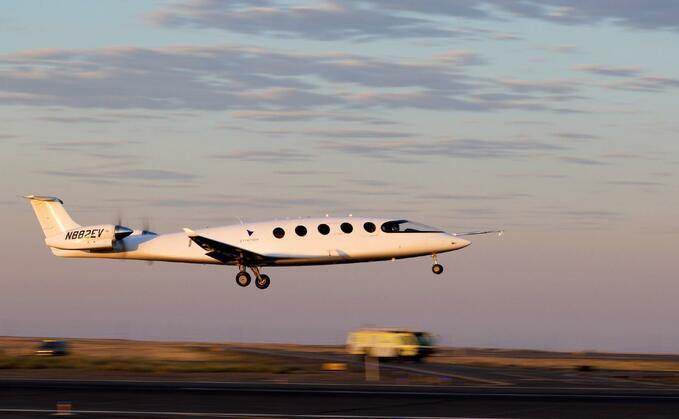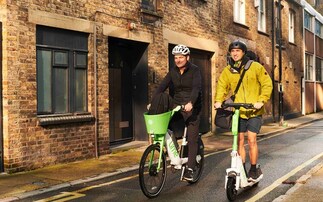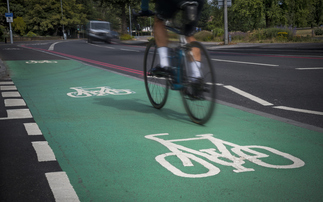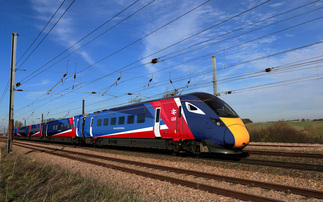
Eviation Aircraft's electric plane during its test flight in 2022. Credit: Eviation Aircraft.
A third of flights in the US are less than 250 miles - which is already within range for electric planes
Sustainable aviation will need many technologies to fully decarbonise, including hydrogen, electric and sustainable aviation fuel. Most of these are still prohibitively expensive, don't have enough scale or volume and aren't ready for long-haul flights.
But Eviation Aircraft, a start-up based in Washington, isn't concerned with the long haul. According to its CEO, Greg Davis, there's a growing market in commuter flights — trips that are less than 250 miles — that is perfect for its electric planes.
Commuter flights made up 29 per cent of flights in the US in 2019, according to The Air Current. During a panel at VERGE 23 - GreenBiz's climate tech conference - Davis said the technology to electrify this sizable market is already here.
In 2022, the company completed its first all-electric test flight for an aircraft that carries nine passengers. Davis hopes the airplane will be commercially operable by 2027. Eviation has already pre-sold $5bn worth of electric aircraft to Air New Zealand and has orders from the shipping company DHL.
Eviation isn't the only one making a move in this space. According to a report from the National Renewable Energy Laboratory, the aerospace and electric industries, including NASA, are working to take advantage of regional airports and commuter planes for quick and emissions-free travel.
While the commuter market might be poised to grow in popularity, The Air Current also stated that the true size for the electric flight market is only one per cent of the commercial market due to regulatory restrictions, the less popular regional routes and the small number of passengers these aircraft can hold.
Nevertheless, a McKinsey report from May found that if factors align, the short-haul segment could grow from $75bn to $115bn by 2035, closing in on 700 million passengers a year.
This commuter flight market might be the perfect stepping stone for the massive infrastructure transitions, electrical grid updates and consumer behaviour changes that will need to shift in order for electric aircrafts to become the norm. The technology is further along than most people think.
"The largest misconception is that the technology is not ready," Davis of Eviation said. "It's here today. We're doing it. We just have to take it, commercialise it and get it into production."
Readying airport infrastructure for e-planes
Electrifying these commuter flights that are usually under 90 minutes will help push the sustainable aviation industry forward for all routes and provide a runway for electrifying larger airports.
Among the biggest updates airports must make to electrify flights, build the charge infrastructure and extend the electrical grid into areas of the airport, such as hangars, that previously didn't need access to large amounts of power. Starting with these smaller aircraft will serve as an achievable first step.
Jordan Cox, the National Renewable Energy Laboratory's lead researcher of the study, said in the report: "For regional air travel, we're taking flight demand and turning it into charging demand. From charging demand, we can look at infrastructure — how does demand fit with transmission, distribution, and generation? We are quantifying the possible outcomes of electrified air transit so that everyone has an early notion of what to expect."
So even if long-haul aircraft never go fully electric, according to Davis, hybrid planes will definitely be part of aviation's electronic transition, and they will also need access to this charging infrastructure.
Davis also cited conversations he has had with airlines to transform taxiways for giant 747s into runways for smaller electric commuter aircraft (that still can be used as taxis for the larger planes).
"That's an infrastructure change that's going to transform the way that the airport operates," he said "and it would create dedicated operations for electric aircraft."
Adjusting flyer behaviour
Beyond electrifying larger airports, electric planes could help kick off a return to smaller regional airports. These airports are more convenient for more people. Security is easier, and the airports are closer. About 90 per cent of people in the United States live within a 30-minute drive of a regional airport. Only 60 per cent live within the same distance of a large commercial airport.
Davis said that these regional airports have been hamstrung by noise restrictions that limit when and how often flights can take off. With electric planes this will no longer be an issue.
"Electric engines are quiet," he said. "So we'll be able to go back and start using the airport infrastructure that we already have with the electric commuter."
This convenience will encourage fliers to make the switch, and the reduced emissions will be a bonus and then the norm.
"[Electric aircraft] will just be the normal way that you fly," Davis said, "in the same way that getting in an electric car today is no big deal."
This article originally appeared at GreenBiz
Keep up to date with all the latest green business news by signing up to the free Daily and Weekly BusinessGreen Newsletters







